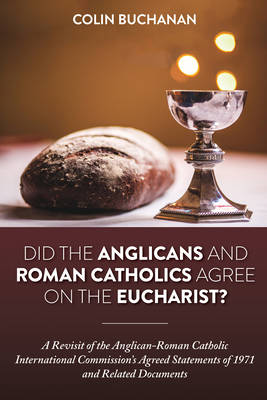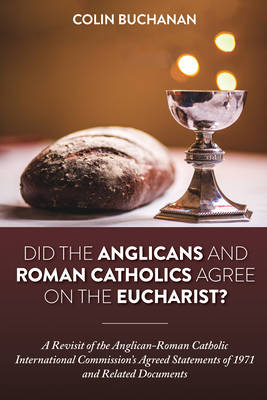
- Retrait gratuit dans votre magasin Club
- 7.000.000 titres dans notre catalogue
- Payer en toute sécurité
- Toujours un magasin près de chez vous
- Retrait gratuit dans votre magasin Club
- 7.000.0000 titres dans notre catalogue
- Payer en toute sécurité
- Toujours un magasin près de chez vous
Did the Anglicans and Roman Catholics Agree on the Eucharist?
A Revisit of the Anglican-Roman Catholic International Commission's Agreed Statements of 1971 and Related Documents
Colin Buchanan
Livre relié | Anglais
70,95 €
+ 141 points
Format
Description
Fifty-two years ago [in 1966] Archbishop Michael Ramsey of Canterbury visited Rome and agreed with the Pope to inaugurate an Anglican-Roman Catholic theological dialogue. Three phases of the Anglican-Roman Catholic International Commission (ARCIC) resulted and continue to this day. ARCIC I agreed on a statement on Eucharistic Doctrine in 1971 and an Elucidation of it in 1979. The Vatican declined full endorsement of these, and in 1994 ARCIC II produced Clarifications of them, which the Vatican accepted as sufficient. Colin Buchanan, who himself published the 1971 Statement in England, has followed the international dialogue closely since 1971. He here prints all the relevant texts and examines in detail the attempted reconciling of traditional Roman Catholic eucharistic belief and Anglican reformed doctrine. His study includes Apostolicae curae and Malines, and in the modern era follows public and synodical debate, and the question of "reception." Three unprecedented unique features are: first, a diachronic study of the one doctrine; second, a fair regard for reformed Anglican beliefs; and third, a relating of dogmatic theology to eucharistic liturgy. The history prompts the question that forms the book's title, and close following of that history also provides the answer.
Spécifications
Parties prenantes
- Auteur(s) :
- Editeur:
Contenu
- Nombre de pages :
- 224
- Langue:
- Anglais
Caractéristiques
- EAN:
- 9781532633850
- Date de parution :
- 17-10-18
- Format:
- Livre relié
- Format numérique:
- Genaaid
- Dimensions :
- 152 mm x 229 mm
- Poids :
- 471 g

Les avis
Nous publions uniquement les avis qui respectent les conditions requises. Consultez nos conditions pour les avis.






